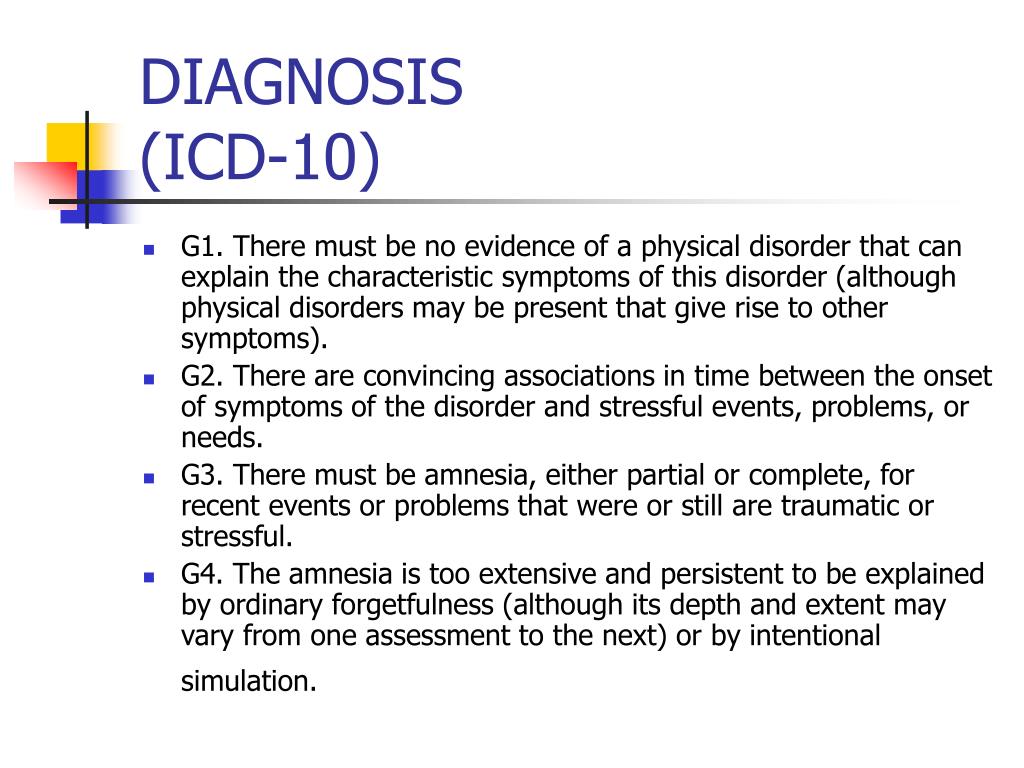

If amnesia is ongoing it can be distressing for both the affected person and their family and friends. Treatment of amnesia depends on the cause. It can affect the ability to form new memories (known as anterograde amnesia) or the ability to remember things from the past (retrograde amnesia). Depending on the cause, amnesia may be temporary or permanent. Lastly keep on top of articles and research to learn about the sequela conditions as we are all in this for the long haul.Amnesia means partial or total loss of memory. Report Z86.19 (personal history of other infectious and parasitic diseases) as an additional diagnosis.
#AMNESIA ICD 10 CODE#
Code first the condition/symptoms treated. When it is unclear if the documented condition/symptoms is related to COVID-19 but there is documented confirmation the patient had COVID-19: The coding guidelines tell us to code first all the condition(s) being treated that are sequela to COVID-19 (e.g., shortness of breath, DVT, fatigue, etc.) and use the additional code B94.8-Sequelae to identify the late effect. Make sure when coding sequela to COVID-19, that the patient had a confirmation of COVID-19 by testing or documentation in the practitioners record. Physicians should also document any patient counseling related to prevention measures to reduce the spread of COVID-19. Query the practitioner if the documentation is not clear. Be specific, documentation must include the relationship with COVID-19 in order to code the condition as sequela. It is important that when coding sequela to COVID-19 any condition/symptoms that is sequela that we list all that are relevant. It is all about the documentation and identifying the condition/symptom sequela to COVID-19. How does this affect Coding Sequela to COVID-19? We need to be prepared for the long haul. With so many new cases of COVID-19 on a daily basis, this is only the beginning. Practitioners will probably continue to treat many more patients with specific conditions and/or signs/symptoms post COVID-19. Most certainly we may see more sequela conditions emerge as more people recover. Some of my symptoms finally went away after a few months, but I am still having some bouts of fatigue and shortness of breath which is being managed medically. Painful symptoms according to the IU survey included symptoms that were painful at 26.5 percent and painless symptoms at 73.5 percent.Īs a long hauler myself having survived COVID-19 eight months ago, I have experienced some of these symptoms. What are some of these symptoms? The most common is fatigue, muscle and body aches, shortness of breath and difficulty breathing, but also these conditions can occurĪnd the list goes on. Some of the potential long-term effects can affect patients who are asymptomatic or have mild cases of COVID-19 as well. In acute cases patients have suffered sopercentme late effect conditions or symptoms according to scientists These conditions/symptoms may last 6 months to a year and more serious late effects may be permanent. I encourage everyone to read this study as it is enlightening. However, a recent study from Indiana University School of Medicine (IUSM) finds that long hauler’s COVID-19 symptoms are more numerous than on the CDC website. 
As cases grow to over 7 million and quickly climbing in the United States with a significant number of patients recovering we are going to see the next wave of patients who need care for sequela conditions (late effects). Early research shows the disease attacks more than just the respiratory system, affecting multiple organs with blood clots and inflammation.Ī study published by the Centers for Disease Control and Prevention (CDC) released Jindicated 35percent of COVID-19 (SARS-CoV-2) outpatients had not returned to usual state of health.

What is not known, however, is what symptoms and complications may linger long after an initial COVID-19 infection. What are post-COVID patients experiencing? Many of post COVID-19 patients are seeing one or more symptoms conditions including shortness of breath, fatigue, thrombosis, dizziness, neurological, cardiovascular and respiratory conditions as well as hearing loss, difficulty concentrating, memory loss, hearing loss, visual problem, strokes, depression, PTSD and more. There are many conditions/signs symptoms and late effects of COVID-19 we are learning about every day and the list keeps growing. There is a term we now use for patients who are suffering from sequela conditions of COVID-19 which is Long Haulers.







 0 kommentar(er)
0 kommentar(er)
